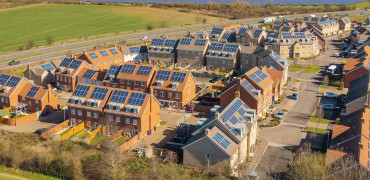The new Labour Government has reacted quickly to tackle changes in our climate by speeding up the targets for delivering renewable and clean energy to our homes, shops, offices and factories.
Its headline announcement ambitiously states that it wants to double onshore wind, triple solar power and quadruple offshore wind – all to be achieved by 2030. This is five years ahead of the previous Government’s target and it should significantly strengthen our energy security.
It’s a scale of ambition to be welcomed, while also demonstrating that the new Government understands the speed and scale with which we need to act, while at the same time ending our reliance on fossil fuels.
Alongside this the Government has announced £13.2 billion is being made available for improving the energy efficiency of five million homes, providing higher degrees of certainty to householders and investors alike.
All parts of the country stand to benefit from the investment with the Northeast of England getting money for 307,000 homes, while the West Midlands will receive money to improve 548,000 homes.
Scotland and Wales are both getting money for hundreds of thousands of homes to be upgraded, while Northern Ireland should receive enough money to improve over 100,000 homes.
The climate is not just going to change in the future, it is already changing
Energy efficiency
The justification for this massive investment is that energy efficiency is the fastest and most effective way to permanently reduce our energy bills.
By making homes more energy efficient through better insulation, people can reduce how much energy they use and therefore the cost of heating a home. The Government’s Warm Homes Plan also provides a big opportunity for businesses that can retrofit properties and install the energy efficiency measures.
Financial support for solar panels, battery storage and low carbon heating will help people to power their homes in a cleaner and cheaper way, while installers should benefit greatly from the increased activity levels, as well as the associated supply chains.
A C rating for landlords
In a separate but related development, the Government has given private landlords until 2030 to get their rented properties up to an EPC ‘C’ rating, or they face being barred from letting them out.
Ed Miliband, the Energy Security and Net Zero Secretary, confirmed the plans shortly after taking office. He told the Commons: “One thing that this Government will do that the last Government did not, is demand that landlords raise the standard of their accommodation to a proper energy performance certificate standard C by 2030.”
He said the move will help support more than three million people in the country facing fuel poverty.
The C rating target mirrors the original Conservative proposals, first mooted in 2021, which would have required all landlords in England and Wales to have a C rated home by 2028 – plans which were axed by former PM Rishi Sunak last year.
The National Residential Landlords Association supports the principle of energy efficient homes, but it also knows that many landlords face significant challenges when it comes to making upgrades, particularly when it comes to insulating older solid brick homes.
It is asking the Government for more information on how properties will be assessed and the details of any exemptions and spending caps, as well as whether funding or other support will be available to landlords when it comes to making improvements.
Extreme temperatures
Meanwhile recent analysis from the Met Office has confirmed that climate change is dramatically increasing the frequency of extreme high temperatures in the UK. Its annual State of the Climate report says data from 2023 shows the country is experiencing significantly more ‘really hot’ days and an increase in the number of ‘really wet’ days as well.
The report finds the UK is also seeing a 40% increase in the number of what the Met Office describes as ‘pleasant’ days - those with temperatures of 20°C or more – and has become 9% sunnier over the last few decades.
Although the warmer temperatures are welcome to many, the changing climate represents a dangerous upheaval for our ecosystems as well as our infrastructure and is a major challenge to the nation’s farmers, undermining our food security in the process.
For example, between 1961 and 1990 only London and Hampshire recorded six or more days a year with temperatures over 28°C – which the Met Office defines as ‘hot days’. By the latest decade (2014-2023) virtually everywhere in England and Wales was seeing this many hot days, while the Southeast now gets over 12 in a year.
The increase in the number of ‘very hot days’ of 30°C or more has been even more dramatic, trebling over the last few decades.
Rainfall patterns vary much more than temperature, but the Met Office says it is still possible to identify an increase in the frequency of the ‘wettest days’. It looked at the top 5% of wettest days in the period 1961 to 1990 and found extremely wet days like these were occurring 20% more frequently in the most recent decade.
"Some of the statistics in this report really do speak for themselves," said lead author and Met Office climate scientist, Mike Kendon. "The climate is not just going to change in the future, it is already changing."
Hot and wet times
The report confirms that 2023 was the second warmest year on record for the UK, had the hottest June ever recorded and the joint warmest September. Separate studies by Met Office scientists found all these events were made much more likely to happen because of human-induced climate change.
February, May, June and September 2023 were all ranked in the top ten warmest on record in the UK for the same months in a series dating back 140 years. Other parts of the world are also experiencing powerful heatwaves including the Mediterranean, Russia, China and Canada.
Back here in the UK, the Met Office says there has been a rapid increase in the frequency of record-breaking warm temperatures in recent years, while there have been virtually no new records for cool weather. For the UK overall the warmest months on record have been May 2024, June 2023, December 2015 and April 2011. The last record cold month was December 2010.
The State of the Climate report also found 2023 was the seventh wettest year on record going back to 1836. March, July, October and December were all among the top ten wettest for the same month in the series.
More energy use
It is these weather extremes - of heat and/or rainfall - that have the biggest impact on people, says Professor Liz Bentley, the Chief Executive of the Royal Meteorology Society. “These changes are leading to more heatwaves and flooding, which profoundly impact communities by straining healthcare systems, damaging infrastructure, and disrupting daily life”, said Professor Bentley.
They also lead to increased consumption of energy whether that’s for air conditioning in our homes and other buildings, or for water pumps to remove water from properties, roads, flooded land and fields.
Extreme heat also presents a serious health hazard, with thousands of deaths attributed to high temperatures every year. Between 2000 and 2019, almost half a million heat-related deaths around the world occurred each year, according to the World Health Organization.
The Met report came as the record for the world's hottest day tumbled twice in one week, according to the European climate change service, Copernicus. On Monday 19th of July the global average surface air temperature reached 17.15°C, breaking the record of 17.09°C set the day before. It beats the record set in July 2023, and it could break again.
Record breaking
Climate change has already made extreme weather events, such as heatwaves, heavy rainfall, storms and droughts, more frequent and stronger in many parts of the world. Scientists say these events will become more intense and happen more often unless the world can make dramatic reductions in greenhouse gas emissions.
“The hottest day record has been broken once again because the world continues to burn huge amounts of oil, gas, and coal," says Friederike Otto, Senior Lecturer in Climate Science at Grantham Institute at Imperial College London.
“Every broken record is a warning that our climate is heating to dangerous levels. These warnings are becoming much more frequent; however, we have all the tools, technology and knowledge to stop things from getting worse – replace fossil fuels with renewable energy and get emissions down to net zero as quickly as possible," she added.
This more than justifies the massive investment in the energy efficiency of our homes and the production of green energy, as well as the shortened timescale for achieving net zero.
Patrick Mooney is News editor, Housing Management & Maintenance




